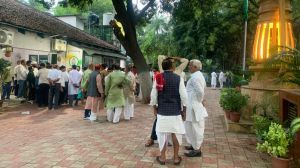After 20 yrs in Pakistan, Ashraf returns home
KARACHI, JUNE 26: Twenty years after he arrived in Pakistan, Muhammad Saleem Ashraf, boarded the Samjhota Express on June 20 at the Lahore...

KARACHI, JUNE 26: Twenty years after he arrived in Pakistan, Muhammad Saleem Ashraf, boarded the Samjhota Express on June 20 at the Lahore Railway Station, to return to India. A few days ago, the Indian High Commission in Islamabad issued an “emergency certificate” to Ashraf (35) to allow him to return to his mother and three sisters in Vaikom, Kerala.
Ashraf’s story in no-man’s land was reported by The Indian Express, two months ago.
On the platform were several of his friends, officials of the Human Rights Commission of Pakistan and well-wishers. He departed with mixed feelings: a Keralite who had made Lahore his second home. As he now arrives in Kerala, people in Lahore say that they look forward to reading his letters.
Born in 1965, in Vaikom, Kerala, it was an argument with his mother after his father’s death that made him leave home. Prior to his death, the elder Ashraf used to repair umbrellas while his wife made mats. After an argument one day with his mother, 14-year-old Ashraf decided to leave home and head for “wherever the train would take me.”
He travelled first to Madras and then to Delhi. After a while, he ended up working at a hotel in Amritsar in 1981. Here he met some people, human traffickers, who promised to take him to a land where the salaries were higher, “a place just like Dubai”.
Following them, he found himself near the Pakistan border but was apprehended by the BSF, which told him to turn back. His escorts abandoned him and he got lost in a vast area in the middle of the night. By morning, he was in Pakistan, where he was promptly taken into custody by the Rangers. “I was questioned, given food and told to go back into India.” They pushed him back but after walking for a while, he took a U-turn and ended up at a village called Jallo Mor.
He was looked after by various people, first by a Pir, then a government servant who enrolled him in a local school. When he had to leave the school, he was taken in by another schoolmate and made a part of that family. “It was when I was living with the family that I started to yearn for my own family,” recalls Ashraf. So in 1988, he wrote to his mother. He could still write in Malayalam.
When she got back to him, he applied for a Pakistani passport and then applied for an Indian visa but was rejected because he told his true story. When he went to the Pakistan interior ministry for help, they cancelled his national identity card. But, as luck would have it, nobody asked him to surrender his Pakistani passport and when he applied again for an Indian visa, he was granted one in 1993.
As a matter of procedure, he told the Pakistani officials that he was going. They advised him not to come back. In 1994, Saleem took the train to India and reached home unannounced. His mother was speechless. The news was flashed by the local newspapers when a reporter got wind of the story and within days police officials arrived at his doorstep and advised him to take a residence permit as he would have to return to Pakistan at the end of his visa duration.
Despite his mother’s petition with the Kerala High Court, he was only allowed a one month extension while the court considered the matter. Soon after, two policemen arrived at his doorstep to take him to Amritsar for deportation to Pakistan.
They had to come back after a plague scare in India resulted in the suspension of train service between India and Pakistan for a limited period. But in November 1994, he was finally sent to Pakistan where intelligence agencies nabbed him for overstaying in India.
He was blindfolded and handcuffed and taken to some unknown place for interrogation. But he was released within three days. Soon, he was pushed back into India but Indian authorities sent him back as he did not have the papers.
He was then arrested and kept in a police station. This time a friend posted a Rs 50,000-bond for him and had him freed. In 1997, following his friend’s advice, he contacted Asma Jahangir, the head of the Human Rights Commission of Pakistan. After relentless requests by the HRCP, the Indian High Commission finally agreed to giving Saleem Ashraf an “emergency certificate”, which is given to Indian nationals visiting Pakistan who have lost their papers, to allow him to return to India.






- 01
- 02
- 03
- 04
- 05

























